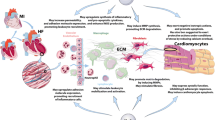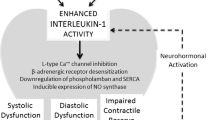Abstract
Over the past decade, a large number of studies have demonstrated that tumor necrosis factor-alpha (TNFα) plays an important role in the development of heart failure. Indeed, administration of TNFα to experimental animals and transgenic over-expression of TNFα replicate the heart failure phenotype. Furthermore, attenuation of the biologic activity of TNFα abrogates the development of heart failure in model systems. These pre-clinical studies, suggested that anti-cytokine therapy could prove beneficial in the treatment of patients with heart failure. While early studies supported this hypothesis, anti-TNF strategies have not demonstrated salutary benefits in large, multicenter randomized and placebo-controlled clinical trials in patients with symptomatic heart failure. This finding was disappointing. However, recent studies might provide clarification of this conundrum. For example, the failure to elicit beneficial effects with anti-cytokine therapy might be explained by novel pharmacogenomic or pharmacodynamic effects, the design of the Phase III clinical trials, or discordance between animal models and the human condition. Thus, appropriately designed clinical trials and newer anticytokine agents may demonstrate benefit.





Similar content being viewed by others
References
Bozkurt B, Kribbs SB. Pathophysiologically relevant concentrations of tumor necrosis factor-alpha promote progressive left ventricular dysfunction and remodeling in rats. Circulation 1998; 97(14): 1382–91
Kubota T, McTiernan CF, Frye CS, et al. Cardiac-specific overexpression of tumor necrosis factor-alpha causes lethal myocarditis in transgenic mice. J Card Fail 1997; 3(2): 117–24
Kubota T, McTiernan CF, Frye CS, et al. Dilated cardiomyopathy in transgenic mice with cardiac-specific overexpression of tumor necrosis factor-alpha. Circ Res 1997; 81: 627–35
Li YY, Feng YQ, Kadokami T, et al. Modulation of matrix metalloproteinase activities remodels myocardial extracellular matrix in TNF [abstract]. Circulation 1999; 100: I–752
Kubota T, Miyagishima M, Bounoutas GS, et al. Overexpression of tumor necrosis factor-α activates the expression of multiple members of the apoptosis pathway in transgenic mice [abstract]. Circulation 1998; 98(17): I462
Chen D, Watkins SC, Li YY, et al. Mitochondrial abnormalities in tumor necrosis factor-alpha-induced heart failure are associated with impaired DNA repair activity. Circulation 2001; 104(20): 2492–7
Bounoutas GS, Kubota T, Miyagishima M, et al. Adenoviral-directed overexpression of soluble tumor necrosis factor receptors reverses myocarditis in transgenic mice with congestive heart failure [abstract]. Circulation 1998; 98(17): I737
Kubota T, Bounoutas GS, Miyagishima M, et al. Development of myocarditis in transgenic mice overexpressing tumor necrosis-α is mediated in part by the selective induction of downstream proinflammatory cytokines and βchemokines [abstract]. Circulation 1998; 98(17): I345
Kolls J, Peppel K, Silva M, et al. Prolonged and effective blockade of tumor necrosis factor activity through adenovirus-mediated gene transfer. Proc Natl Acad Sci U S A 1994; 91: 215–9
Kapadia S, Torre-Arnione G, Yokoyama T, et al. Soluble TNF binding proteins modulate the negative inotropic properties of TNF-alpha in vitro. Am J Physiol 1995; 268(2 Pt 2): H517–25
Li YY, Feng YQ, Kadokami T, et al. Myocardial extracellular matrix remodeling in transgenic mice overexpressing tumor necrosis factor-α can be modulated by anti-tumor necrosis factor α therapy. Proc Natl Acad Sci U S A 2000; 97: 12746–51
Kadokami T, Frye C, Lemster B, et al. Anti-tumor necrosis factor-alpha antibody limits heart failure in a transgenic model. Circulation 2001; 104(10): 1094–7
Gunja-Smith Z, Morales AR, Romanelli R, et al. Remodeling of human myocardial collagen in idiopathic dilated cardiomyopathy: role of metalloproteinases and pyridinoline cross links. Am J Physiol 1996; 148: 1639–48
Spinale FG, Krombach RS, Coker ML, et al. Matrix metalloproteinase inhibition with congestive heart failure improves left ventricular geometry and pump function. Circulation 1997; 96: I520
Kadokami T, McTiernan CF, Kubota T, et al. Effects of soluble TNF receptor treatment on lipopolysaccharide-induced myocardial cytokine expression. Am J Physiol Heart Circ Physiol 2001; 280: H2281–91
Kubota T, Miyagishima M, Alvarez RJ, et al. Expression of proinflammatory cytokines in the failing human heart: comparison of recent-onset and end-stage congestive heart failure. J Heart Lung Transplant 2000; 19: 819–24
Deswal A, Bozkurt B, Seta Y, et al. Safety and efficacy of a soluble P75 tumor necrosis factor receptor (Enbrel, etanercept) in patients with advanced heart failure. Circulation 1999; 25: 3224–6
Bozkurt B, Torre-Amione G, Smith-Warren M, et al. Results of Targeted Anti-Tumor Necrosis Factor Therapy With Etanercept (ENBREL) in patients with advanced heart failure. Circulation 2001; 103: 1044–7
Haslett PA. Anticytokine approaches to the treatment of anorexia and cachexia. Semin Oncol 1998; 25 (2 Suppl. 6): 53–7
Bergman MR, Holycross BJ. Pharmacological modulation of myocardial tumor necrosis factor alpha production by phosphodiesterase inhibitors [published erratum appears in J Pharmacol Exp Ther 1997 Jan; 280 (1): 520]. J Pharmacol Exp Ther 1996; 279(1): 247–54
Liu Y, Fong M, Cone J, et al. Inhibition of adenosine uptake and augmentation of ischemia-induced increase of interstitial adenosine by cilostazol, an agent to treat intermittent claudication. J Cardiovasc Pharmacol 2000; 36(3): 351–60
Uchiyama M, Kozaki K, Nemoto T, et al. Liver transplantation from non-heart-beating donors: effect of machine perfusion preservation and pentoxifylline. Transplant Proc 1998; 30(7): 3798–800
Huizinga TW, Dijkmans BA, van der Velde EA, et al. An open study of pentoxyfylline and thalidomide as adjuvant therapy in the treatment of rheumatoid arthritis. Ann Rheum Dis 1996; 55(11): 833–6
Vasquez EM, Pollak R. Effect of oral pentoxyfylline on the OKT3-induced cytokine-release syndrome among renal allograft recipients. Clin Transplant 1996; 10(3): 294–7
Silwa K, Skudicky D, Candy G, et al. Randomised investigation of effects of pentoxifylline on left-ventricular performance in idiopathic dilated cardiomyopathy. Lancet 1998; 351(9109): 1091–3
Staubach KH, Schroder J, Stuber F, et al. Effect of pentoxifylline in severe sepsis: results of a randomized, double-blind, placebo-controlled study. Arch Surg 1998; 133(1): 94–100
Wagner DR, Combes A, McTiernan CF, et al. Adenosine inhibits lipopolysaccharide-induced cardiac expression of tumor necrosis factor-. Circ Res 1998; 82: 47–56
Wagner DR, McTiernan CF, Frye CS, et al. Adenosine inhibits lipopolysaccharideinduced secretion of tumor necrosis factor-alpha in the failing human heart. Circulation 1998; 97: 521–4
Sajjadi FG, Takabayashi K, Foster AC, et al. Inhibition of TNF-alpha expression by adenosine: role of A3 adenosine receptors. J Immunol 1996; 156(9): 3435–42
Loh E, Rebbeck TR, Mahoney PD, et al. Common variant in the AMPD1 gene predicts improved clinical outcome in patients with heart failure. Circulation 1998; 99(11): 1422–5
Feldman AM, McNamara DM, Wagner DR, et al. AMPD1 gene mutation in congestive heart failure: new insights into the pathobiology of disease progression. Circulation 1998; 99(11): 1397–9
Galinanes M, Qiu Y, Van Belle H, et al. Metabolic and functional effects of the nucleoside transport inhibitor R75231 in the ischaemic and blood reperfused rabbit heart. Cardiovasc Res 1993; 27(1): 90–5
Masuda M, Demeulemeester A, Chen CC, et al. Cardioprotective effects of nucleoside transport inhibition in rabbit hearts. Ann Thorac Surg 1991; 52(6): 1300–5
Sommerschild HT, Lunde PK, Deindl E, et al. Elevated levels of endogenous adenosine alter metabolism and enhance reduction in contractile function during low-flow ischemia: associated changes in expression of Ca (2+)-ATPase and phospholamban. J Mol Cell Cardiol 1999; 31(10): 1897–911
Van Belle H, Verheyen W, Ver DK, et al. Prevention of catecholamine-induced cardiac damage and death with a nucleoside transport inhibitor. J Cardiovasc Pharmacol 1992; 20(2): 173–8
Flameng W, Sukehiro S, Mollhoff T, et al. A new concept of long-term donor heart preservation: nucleoside transport inhibition. J Heart Lung Transplant 1991; 10(6): 990–8
Mollhoff T, Sukehiro S, Van Belle H, et al. Successful transplantation after long-term preservation of dog hearts. Anesthesiology 1992; 77(2): 291–300
Van Belle H. Nucleoside transport inhibition: a therapeutic approach to cardioprotection via adenosine? Cardiovasc Res 1993; 27(1): 68–76
Yang X, Zhu Q, Claydon MA, et al. Enhanced functional preservation of coldstored rat heart by a nucleoside transport inhibitor. Transplantation 1994; 58(1): 28–34
Rongen GA, Lenders JW, Lambrou J, et al. Presynaptic inhibition of norepinephrine release from sympathetic nerve endings by endogenous adenosine. Hypertension 1996; 27(4): 933–8
Wainwright CL, Parratt JR, Van Belle H. The antiarrhythmic effects of the nucleoside transporter inhibitor, R75231, in anaesthetized pigs. Br J Pharmacol 1993; 109(2): 592–9
Belardinelli L, Shryock JC, Snowdy S, et al. The A2A adenosine receptor mediates coronary vasodilation. J Pharmacol Exp Ther 1998; 284(3): 1066–73
Kadokami T, McTiernan CF, Frye CS, et al. Sex-related survival differences in murine cardiomyopathy are associated with differences in TNF-receptor expression. J Clin Invest 2000; 106: 589–97
Kadokami T, McTiernan CF, Kubota T, et al. Long term estradiol treatment improves survival in male mice with heart failure induced by cardiac specific TNF- expression [abstract]. Circulation 2000; 102(Suppl.): II–72
Shusterman V, Usiene I, Harrigal C, et al. Strain-specific patterns of autonomic nervous system activity and susceptibility in mice. Am J Physiol Heart Circ Physiol. 2002; 282(6) H2076–83
Deswal A, Petersen NJ, Feldman AM, et al. Cytokines and cytokine receptors in advanced heart failure: an analysis of the cytokine data base from the Vesnarinone Trial (VEST). Circulation 2001; 103: 2055–9
Messer G, Spengler U, Jung MC, et al. Polymorphic structure of the tumor necrosis factor (TNF) locus: an Ncol polymorphism in the first intron of the human TNF-beta gene correlates with a variant amino acid in position 26 and a reduced level of TNF-beta production. J Exp Med 1991; 173: 209–19
Danis VA, Millington M, Hyland V, et al. Increased frequency of the uncommon allele of a tumor necrosis factor alpha gene polymorphism in rheumatoid arthritis and systemic lupus erythematosus. Dis Markers 1994; 12: 127–33
McGuire W, Hill AVS, Allsopp CEM, et al. Variation in the TNF-alpha promoter region associated with susceptibility to cerebral malaria. Nature 1994; 371: 508–11
Kubota T, McNamara DM, Wang JJ, et al. Effects of tumor necrosis factor gene polymorphisms on patients with congestive heart failure. VEST Investigators for TNF Genotype Analysis. Vesnarinone Survival Trial. Circulation 1998; 97: 2499–501
Wrighton SA, Stevens JC. The human hepatic cytochromes P450 involved in drug metabolism. Crit Rev Toxicol 1992; 22: 1–21
Morgan ET. Regulation of cytochromes P450 during inflammation and infection. Drug Metab Rev 2002; 29: 1129–88
Frye RF, Schneider VM, Frye CS, et al. Plasma levels of TNF-alpha and IL-6 are inversely related to cytochrome P450-dependent drug metabolism in patients with congestive heart failure. J Card Fail 2002; 8(5): 315–9
Scallon BJ, Moore MA, Trinh H, et al. Chimeric anti-TNF-alpha monoclonal antibody cA2 binds recombinant transmembrane TNF-alpha and activates immune effector functions. Cytokine 1995; 3: 251–9
Acknowledgements
The authors have no conflicts of interest directly relevant to the content of this review.
Author information
Authors and Affiliations
Rights and permissions
About this article
Cite this article
Feldman, A.M., McTiernan, C. Is There Any Future for Tumor Necrosis Factor Antagonists in Chronic Heart Failure?. Am J Cardiovasc Drugs 4, 11–19 (2004). https://doi.org/10.2165/00129784-200404010-00002
Published:
Issue Date:
DOI: https://doi.org/10.2165/00129784-200404010-00002




